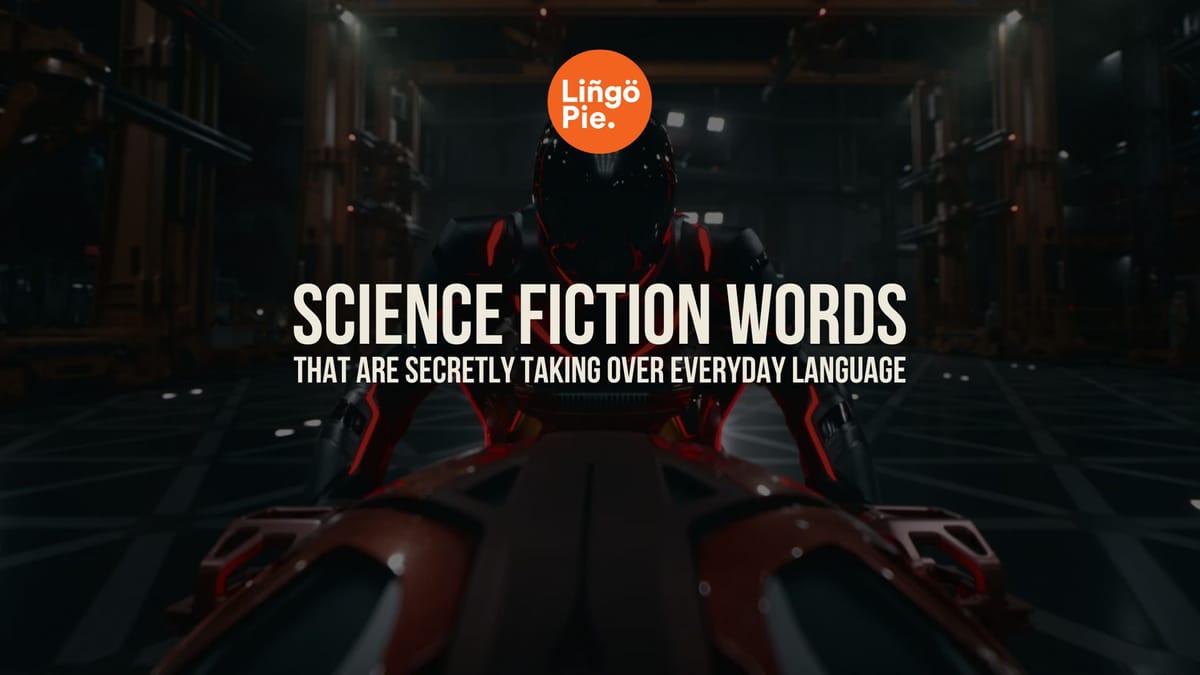This week Tron: Ares lights up the screen, bringing the digital world of the Grid back to life. Sci-fi fans are excited for the action, the visuals, and the return of a cult classic franchise. But there is something else worth noticing...
Every time a big science fiction story arrives, it leaves a mark on pop culture AND language.
Words that once sounded futuristic, like robot, metaverse, or AI, were born in novels and films. Today, they are part of everyday English. What started as science fiction terms has become the way we describe our technology, our future, and even our daily routines.
That is why the release of Tron: Ares is the perfect moment to look back at the science fiction terms that have moved from fantasy into reality, and why they are such a valuable resource for anyone learning English today.
- How Dual Subtitles Accelerate Language Learning (And Where to Find Them)
- How to Use Streaming Services for Language Learning [Guide]
- Hungry to Learn Korean? 20+ Culinary Words from Bon Appétit, Your Majesty

How to Practice with Sci-Fi Terms
The best way to learn new vocabulary is by hearing it in context. With Lingopie you can watch real sci fi content while following along with subtitles. This allows you to see and hear how terms are used naturally, which helps you remember them more effectively than studying word lists.

Lingopie also gives you tools designed for learners. You can click on any word from the dual subtitles for an instant translation, save it to review later, and even turn scenes into practice exercises. This makes it easy to build your understanding of sci fi vocabulary while enjoying stories you already love.
Classic Science Fiction Terms That Became Common
Science fiction has always been more than entertainment. It is a playground for ideas, and many of those ideas eventually escape into real life. What begins as a word in a novel or film can move into our everyday vocabulary. Some of the most common terms in English today once felt futuristic or even impossible.
- Robot – First introduced in the 1920s play R.U.R., where machines replaced human workers.
- Cyborg – Short for “cybernetic organism,” a human enhanced with technology.
- Artificial Intelligence (AI) – For decades this meant futuristic machines in stories.
- Spaceship – Once the dream of pulp novels, it became reality with NASA missions and now SpaceX rockets.
These terms show how science fiction does more than imagine new worlds. It invents new language, and eventually, it becomes how we describe our world.
Modern Sci-Fi Terms You Already Know
Science fiction has continued to influence the way we speak, especially in recent decades. Many words that once appeared only in futuristic stories now belong to our daily vocabulary.
- Avatar – A digital representation of a person. The word comes from Sanskrit, meaning “descent,” and it was popularized by science fiction novels and online role-playing games.
- Metaverse – A shared virtual world. The term was first used in Neal Stephenson’s 1992 novel Snow Crash.
- Hologram – A three-dimensional image created with light. The word comes from Greek roots meaning “whole” and “message.”
- Drone – An unmanned flying vehicle. The word existed earlier in military contexts but gained new life in sci-fi.
- Virtual Reality (VR) – A computer-generated environment that simulates reality. The idea appeared in science fiction long before it became real technology.

Sci-Fi Words That Still Sound Futuristic
Not every science fiction idea has become part of ordinary life yet. Some words are still tied to stories about the future, but they are slowly entering scientific discussions and popular culture. For language learners, these terms are useful to know now, since they may soon become everyday English.
- Singularity – A theoretical moment when artificial intelligence becomes more advanced than human intelligence. The word has been used in physics, but science fiction popularized it in stories about future technology.
- Quantum Computing is a type of computing that uses quantum mechanics to process information. Scientists developed the concept, which became widely known through science fiction. It is still an emerging technology, often mentioned in research and tech news.
- Nanobots – Tiny robots at the scale of molecules or atoms. The idea became popular in science fiction novels during the late twentieth century. Scientists are now exploring nanotechnology in medicine, but nanobots are not yet a daily reality.
- Neural Link (or Brain–Computer Interface) – A direct connection between the human brain and a computer. Science fiction has imagined this for decades.
These words may not yet be part of everyday speech, but they show how science fiction continues to shape the language of the future.

Why Sci-Fi Vocabulary Helps Language Learners
Science fiction is a practical tool for learning languages. If you already enjoy it, you can use shows and films like Tron: Ares to build vocabulary in English or in any other language you want to study.
- Shared terms: Words like robot, AI, and cyber appear in many languages with little change. They give you an easy starting point.
- Dubs and subtitles: Watching Tron: Ares in another language shows you how sci-fi terms are translated. Compare English with Spanish, French, or Japanese versions to see differences.
- Repetition: Sci-fi often repeats phrases such as “run the program” or “escape the system.” This helps reinforce new words when you hear them in your target language.
- Mix of registers: Dialogues combine everyday conversation with technical words, so you learn both daily expressions and specialized vocabulary.
By watching sci-fi in multiple languages, you not only enjoy the story but also train your ear, expand your vocabulary, and understand how different cultures adapt the same futuristic ideas.
Start Learning Sci-Fi Vocabulary with Lingopie
Science fiction has given us words that once felt futuristic and now feel natural, from hologram to metaverse to nanobots. These terms show how stories about imagined worlds become part of everyday speech. For anyone studying a language, sci fi is not only entertaining but also a practical way to discover words that connect technology, culture, and imagination.
With Lingopie, you can turn that discovery into daily practice. Watch real content with subtitles, click on any unfamiliar term for an instant translation, and review it later with built-in exercises. Try Lingopie today and make the next sci-fi adventure part of your language learning journey.




![How Long Does It Take To Learn German? [2026 Guide]](/blog/content/images/2025/10/how-long-does-it-take-to-learn-german.jpg)


![7 Best Greek TV Series You Need To Watch Today [2026]](/blog/content/images/size/w300/2026/02/Greek-TV-Shows.jpg)

